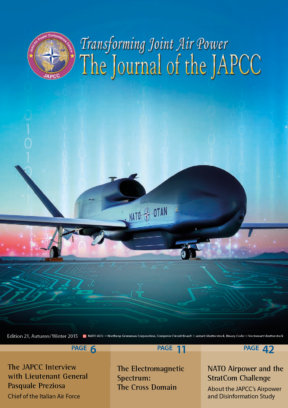Editorial
It is my great pleasure to present you the 21st Edition of the JAPCC Journal. The opening article of this edition is an interview with Lieutenant General Preziosa, Chief of the Italian Air Force, who gives us an insight into Italian contributions to overcome critical capability shortfalls in NATO, both through national projects and by leveraging multinational cooperation.
The Journal subsequently offers a selection of essays covering a variety of topics. The field of information dominance is addressed in two articles exploring the fields of Electronic Warfare and advanced network-centric platform communication. ‘The Electromagnetic Spectrum: The Cross Domain’ educates us on the principles of Electronic Warfare and the challenge of the competitive use of the extremely complex Electromagnetic Environment, while ‘Joint Employment Zones (+)’ elaborates on forms of tactical communication that will contribute to the organization and synchronization of complex warfare activities at platform level. Critical thought within NATO is inspired by the two exposés ‘Is NATO’s MPA Force prepared for resurgent Russian submarine patrols?’ and ‘Institutionalizing C-IED Lessons Learned from Afghanistan’. Another article, ‘China’s Aerospace Power 2015’ informs about the modern anti-access area-denial (A2/AD) capabilities of the People’s Liberation Army Air Force and implies a key takeaway for NATO. More threat analysis is provided in ‘Small Drones: From Cheap Toys to Terrorist Tools’ by illustrating the potentially nefarious use of commercial small drones as well as describing associated detection and disruption issues. Further articles deal with new challenges faced by Italian Naval Air Power, address the consequence of the persistent lack of a NATO Space Policy, and promote the importance of Information Knowledge Management (IKM) as a mission essential asset.
This journal furthermore directs our reader’s attention to a very relevant issue, ‘Strategic Communications’. Today’s global communication capabilities greatly amplify the impact and speed with which one can change foreign and domestic public opinion and thereby eventually influence the Alliance and the way it conducts operations. Disinformation campaigns carried out against NATO and coalition forces in recent operations in Afghanistan and Libya specifically characterize Air Power as an inhumane and indiscriminate means of war. Disinformation and misinformation about Air Power also steer political debate. A very prominent example is the discussion about the legitimacy and legality of using weaponized ‘drones’. This edition, therefore, provides particular emphasis on the subject of ‘NATO Air Power and the Strategic Communications Challenge’, with an article of the same title that introduces us to a JAPCC study currently being conducted in partnership with academic researchers.
I congratulate the authors on their contributions to this 21st JAPCC Journal and I strongly encourage our readers to consider their efforts as you go forth and advocate for Air Power. The JAPCC team greatly appreciates your feedback and thoughts. Please visit our website at www.japcc.org, where you will find contact information and additional Air & Space Power content.
Madelein Spit
Air Commodore, NE AF
Assistant Director, JAPCC








